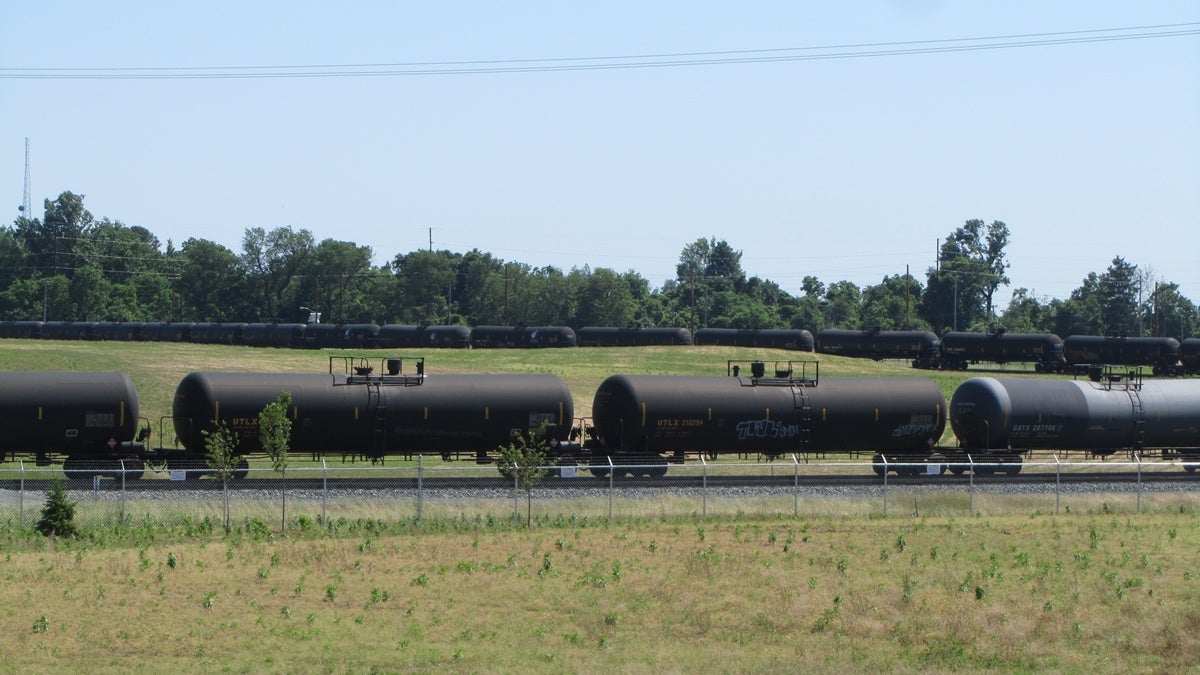Delaware City refinery officials ease rail safety concerns

Train cars line up near the refinery (file/NewsWorks)
Delaware City Oil Refinery officials addressed community concerns during a public safety meeting with Delaware City residents held Monday night.
The refinery, managed by parent company PBF Energy, has faced harsh criticism from neighbors over its business and safety practices.
Most recently, residents have raised concerns over the increase in rail activity going on near the plant. Last year, the refinery, which was acquired from Valero in Dec. 2010, began purchasing more crude oil from the Midwest and Canada and shipping it by rail.
Among the chief concerns was the amount of noise and the brightness of lights originating from the plant in the middle of the night. Neighbors were also apprehensive about the site’s emergency preparedness.
During the public safety meeting, hosted by state Representative Valerie Longhurst, D-Bear, Herman Seedorf, the refinery’s plant manager, had the opportunity to announce some of the improvements the plant introduced following public input.
Seedorf said that his personnel have dimmed the lighting and reduced noise during nighttime operations. Plant personnel also try to be considerate about keeping intersections open during certain times of the day.
“When we looked at the crossing on Route 9, one of the things we saw was, in the morning, we have a lot of school buses going back and forth so we said, ‘You know what, those school buses have to get to school and those kids have to get to school, so there are times of the day when we are not going to cross Route 9,’” Seedorf said.
DelDOT on hand at meeting
In addition to representatives from the refinery, more than a dozen emergency personnel were on hand to answer the community’s questions about safety and discuss the plans they have in place.
Delaware Department of Transportation officials said that numerous improvements are being made to rail and road intersections in New Castle County, including repaving projects and the installation of safety features, such as additional lighting and cross guards.
Gene Donaldson of DelDOT said that his organization is developing technology that will notify the public and EMS when trains are blocking intersections.
“We’re installing relays that tell us at the transportation management center when the gates are down, when a train is crossing the tracks,” explained Donaldson. “We’ll bring that information into the transportation management center and then distribute through our information outlets.”
Through DelDOT’s website and mobile phone application, anyone will be able to see the blocked intersections. Officials predict that this will be an especially helpful tool for first responders.
Emergency preparedness
PBF Energy said that having a top notch safety record is their number one priority, as it is no secret that the crude oil being shipped by rail is harmful if it is spilled or released. Last year, the company made 5.3 million shipments of what it termed “hazardous materials” with a 99 percent safety record.
In addition, PBF officials said that they are in the process of switching out more than 5,000 rail cars to feature new and improved safety standards.
They’ve also conducted extensive planning with various local, county and statewide emergency officials in the event of an accident.
Dave Carpenter of the New Castle County Emergency Management office said that if a serious emergency were to occur, the responsibility falls to the incident commander to decided how to notify the public.
Most likely, Carpenter suggested, first responders would issue information to the media along with posting alerts to various websites and social media.
For something more catastrophic, as in a situation where officials would need residents to shelter in place or evacuate, first responders would likely issue a report over the emergency alert system. This would send a notification similar to the way severe weather broadcasts or Amber Alerts are issued.
A new system, smart911.com, allows residents to update their preferred means of contact.
Following the meeting, Rep. Longhurst said that many residents expressed a better understanding of what the state and refinery are doing to improve safety.
“They didn’t realize how many people are involved in this whole process,” she said. “We have cabinet secretaries all the way down to paramedics, so I think it was an educational thing for them.”
WHYY is your source for fact-based, in-depth journalism and information. As a nonprofit organization, we rely on financial support from readers like you. Please give today.




